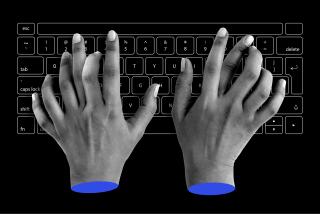The Times Joins in Commissioning Analysis of Florida Ballots
- Share via
WASHINGTON — A group of the nation’s largest news organizations, including The Times, agreed Tuesday to retain a prominent social science research firm to conduct an in-depth review of disputed presidential ballots in Florida.
The National Opinion Research Center, an independent, nonprofit group affiliated with the University of Chicago, ultimately will produce a database detailing the 180,000 Florida ballots that were rejected during machine-based vote tabulations after the Nov. 7 election.
The news organizations said that the review is not designed as a “recount” of such votes but will attempt to produce a public record of the marks, or lack of marks, on each ballot. The center thus will not assess if any one ballot should have been counted as a vote for either George W. Bush or Al Gore but will simply describe the marks.
“This project isn’t a recount,” said John Carroll, editor and executive vice president of The Times.
“The recounts have already been done and the next president has been elected,” Carroll said. “Instead, this is an effort to find out what useful information those ballots may contain. We’ll leave it up to our readers to decide what they think about whatever we find.”
In a news release, the media groups said that the review of ballots from Florida’s 67 counties will produce “the definitive historical archive of Florida ballots that did not register a vote in the presidential election, using the highest standards of scientific accuracy and transparency.”
The project nonetheless is likely to be controversial. Some Republican lawmakers and Bush aides have denounced any attempts to examine Florida’s ballots further, arguing that the results could mislead the public and undermine confidence in the Bush presidency.
The U.S. Supreme Court halted a statewide recount of disputed ballots in Florida on Dec. 12, five weeks after the election. At that point, Bush’s fluctuating lead over Gore had shrunk to just 154 votes.
Under the agreement signed Tuesday, researchers will review undervotes, in which no vote for president was recorded, and overvotes, in which marks were detected for more than one candidate. Journalists will not handle the ballots.
The Times and the other news organizations agreed to make the data available to the public shortly after results of the review are available. The process is expected to take about 10 weeks and cost at least $500,000.
The news groups sharing costs and organizing the review are Associated Press, Cable News Network, the New York Times, the Palm Beach Post, St. Petersburg Times, Tribune Publishing, the Wall Street Journal and the Washington Post Co. Tribune Publishing, based in Chicago, owns the Los Angeles Times, the Chicago Tribune, Newsday, the Orlando Sentinel and the South Florida Sun-Sentinel. The news groups invited other media organizations to participate.
The research center conducts large-scale public opinion and other social science surveys, mostly for government agencies and foundations. Founded in 1941, it is considered a pioneer in survey-based research of health, education, labor, crime, the environment and other issues. The center does no polling on behalf of political candidates or parties, according to spokeswoman Julie Antelman.
Each news group will use the raw data gathered by the researchers to produce its own analyses and stories about what the ballots reveal and how the use of different standards might have affected election results.
Under the contract, the center will screen and train 20 teams composed of three trained coders each to classify the ballots into 40 different categories to reflect the varying systems used by county canvassing boards during manual recounts after the election. Center officials said the use of three independent coders would ensure accuracy and reliability and guard against possible partisan biases.
The Miami Herald and its parent company, Knight Ridder Inc., launched their own review last month of about 60,000 undervotes in Florida. They hired an accounting and consulting firm, BDO Seidman LLP, to observe each ballot and record the marks it finds. Several other groups also have begun limited ballot reviews in the state.
Since all ballots are anonymous, it is impossible for the various media groups to determine who voted for whom.
“The close presidential vote in Florida left a long list of unanswered questions,” Carroll said. “What might the result have been if statewide recounts had been carried out under any of several possible standards? How many votes weren’t counted because of problems that could have been corrected? What can states and counties learn from the Florida vote to make future elections more reliable? We believe this project can provide some answers.”
More to Read
Sign up for Essential California
The most important California stories and recommendations in your inbox every morning.
You may occasionally receive promotional content from the Los Angeles Times.














